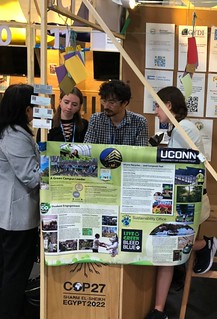 COP27 was one of the most meaningful weeks of my life. Full of dynamic challenges, I feel my worldview of climate change vastly evolved and broadened. COP27’s goals were to implement policies on adaptation and mitigation and loss and damages: two concepts I only tangentially worked with. I realized the importance of these missions when I heard this quote at the Ocean Alliance pavilion: “conservation without funding is just conversation.” Spending so much of my time at UConn connecting with the land, I feel I dismissed the financial aspect of climate change. It seemed unimportant when I could listen to the trees and the animals. But hearing the cries from people for the implementation of loss and damages, awakened me to the importance of finance. I attended a panel discussing financial changes since the adoption of the Glasgow Pledge during COP26. It was a contrasting panel: people from the global south passionately and desperately asking for progress at this COP and people from the global north indifferently talking about frivolous roadblocks to reparations and justice. So distributing that funding is immensely important to conservation work. Without that action, we are simply engaging in tedious conversations that don’t further climate policy whatsoever. COP27 opened my world to a whole new sector of sustainability.
COP27 was one of the most meaningful weeks of my life. Full of dynamic challenges, I feel my worldview of climate change vastly evolved and broadened. COP27’s goals were to implement policies on adaptation and mitigation and loss and damages: two concepts I only tangentially worked with. I realized the importance of these missions when I heard this quote at the Ocean Alliance pavilion: “conservation without funding is just conversation.” Spending so much of my time at UConn connecting with the land, I feel I dismissed the financial aspect of climate change. It seemed unimportant when I could listen to the trees and the animals. But hearing the cries from people for the implementation of loss and damages, awakened me to the importance of finance. I attended a panel discussing financial changes since the adoption of the Glasgow Pledge during COP26. It was a contrasting panel: people from the global south passionately and desperately asking for progress at this COP and people from the global north indifferently talking about frivolous roadblocks to reparations and justice. So distributing that funding is immensely important to conservation work. Without that action, we are simply engaging in tedious conversations that don’t further climate policy whatsoever. COP27 opened my world to a whole new sector of sustainability.
Alternatively, it expanded my perspective on a sector I thought I understood. At UConn, I help submit the greenhouse gas inventory. I collect data from the university’s departments on emissions and then submit those statistics to an online platform that pulls it all together into a coherent distribution. I had the privilege of attending a panel on the Emissions Gap Report 2022 at COP27. The report looks at humanity’s current emissions relative to where we should be based on the promises of the 2015 Paris Climate Agreement. In the context of my work, I found their report to be innovative and inspiring. The collective intellect of the group yielded a holistic report that is used as a foundation for so much climate policy and activism – you have to appreciate its ingenuity and utility in the emerging world. But a quote from the panel set in the gravity of our situation: “The reality is that we are currently in a 1.12°C warmer world and it is already a living hell for many communities.” Reconciling my appreciation for the numerical analysis of climate change with my understanding of climate change as a human rights crisis is something I haven’t confronted to this point. Academia can be somewhat isolating, I think. It can feel theoretical reading about the climate crisis, and I think as a result, a sort of naivety developed with regards to climate change. So, it makes sense that my undergraduate degrees (Mathematics and Environmental Science) have felt separate. Moving forward, my task is to marry these two to strengthen my environmentalism.
I think I’ll use the words of author Chimamanda Ngozi Adichie to capture my closing feelings after COP27: there is no single story on climate change. To buy into this narrative of doom and guilt is unfair to all the meaningful climate work done by people like those at COP. It erases their stories and discourages others from ever wanting to improve the world. Of course, climate work is upsetting. I sobbed multiple times throughout the week and had to excuse myself from the room. It means I have empathy: that I understand this is a living nightmare for our plant friends, our animal friends, and of course, our human friends. But to let those feelings consume yields nothing. Instead, I feel a buoyancy I didn’t possess before the conference. COP27 was a further call to action for me. I will always devote myself to helping the plants, the animals, and my fellow humans. I care for the Earth, and I know it does the same for me.